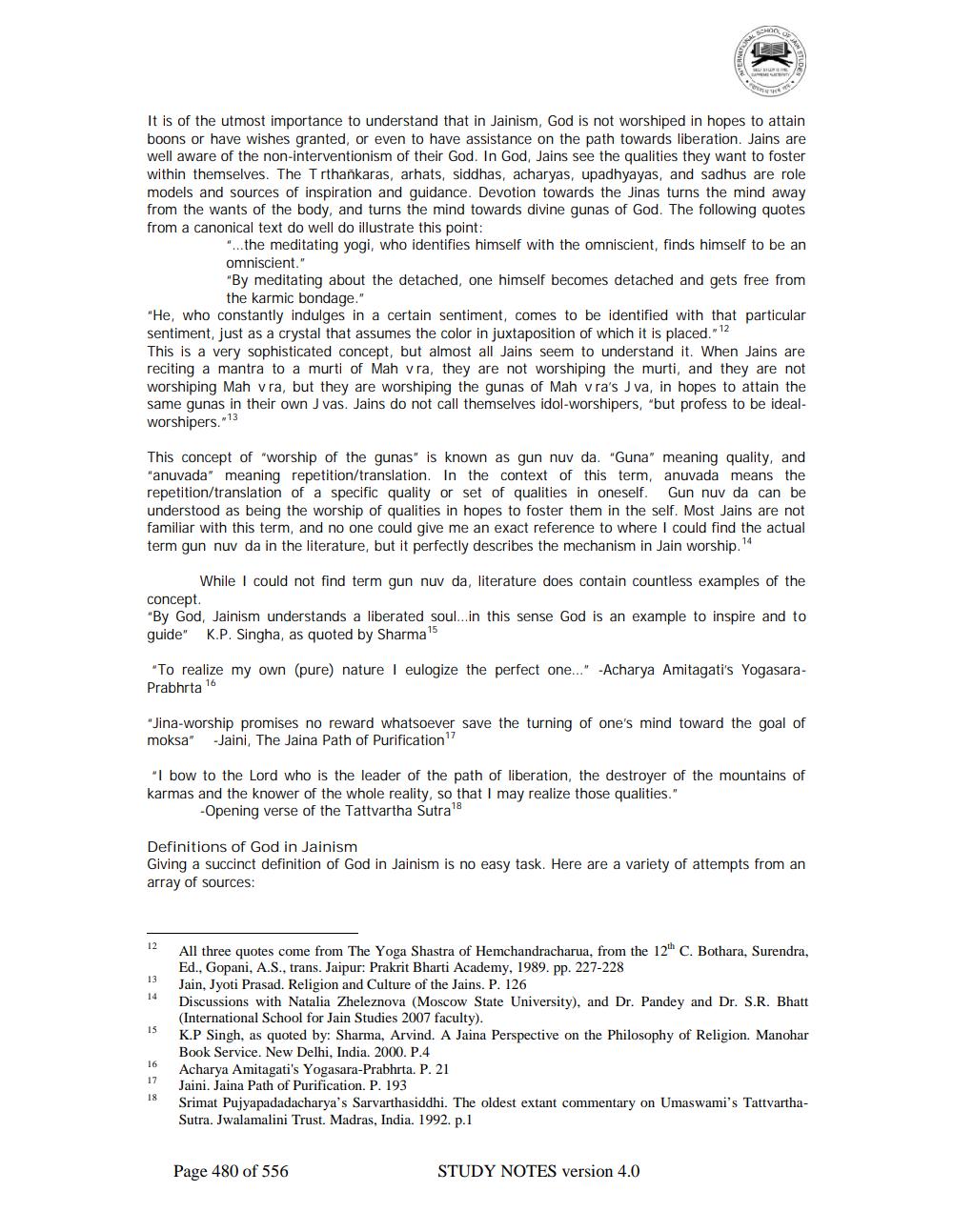________________
It is of the utmost importance to understand that in Jainism, God is not worshiped in hopes to attain boons or have wishes granted, or even to have assistance on the path towards liberation. Jains are well aware of the non-interventionism of their God. In God, Jains see the qualities they want to foster within themselves. The Trthankaras, arhats, siddhas, acharyas, upadhyayas, and sadhus are role models and sources of inspiration and guidance. Devotion towards the Jinas turns the mind away from the wants of the body, and turns the mind towards divine gunas of God. The following quotes from a canonical text do well do illustrate this point:
"... the meditating yogi, who identifies himself with the omniscient, finds himself to be an omniscient."
"He, who constantly indulges in a certain sentiment, comes to be identified with that particular sentiment, just as a crystal that assumes the color in juxtaposition of which it is placed." 12 This is a very sophisticated concept, but almost all Jains seem to understand it. When Jains are reciting a mantra to a murti of Mah vra, they are not worshiping the murti, and they are not worshiping Mah vra, but they are worshiping the gunas of Mah vra's Jva, in hopes to attain the same gunas in their own J vas. Jains do not call themselves idol-worshipers, "but profess to be idealworshipers. 13
"By meditating about the detached, one himself becomes detached and gets free from the karmic bondage."
This concept of "worship of the gunas" is known as gun nuv da. "Guna" meaning quality, and "anuvada" meaning repetition/translation. In the context of this term, anuvada means the repetition/translation of a specific quality or set of qualities in oneself. Gun nuv da can be understood as being the worship of qualities in hopes to foster them in the self. Most Jains are not familiar with this term, and no one could give me an exact reference to where I could find the actual term gun nuv da in the literature, but it perfectly describes the mechanism in Jain worship. 14
While I could not find term gun nuv da, literature does contain countless examples of the
concept.
"By God, Jainism understands a liberated soul...in this sense God is an example to inspire and to guide" K.P. Singha, as quoted by Sharma15
"To realize my own (pure) nature I eulogize the perfect one..." -Acharya Amitagati's YogasaraPrabhrta1
"Jina-worship promises no reward whatsoever save the turning of one's mind toward the goal of moksa" -Jaini, The Jaina Path of Purification17
"I bow to the Lord who is the leader of the path of liberation, the destroyer of the mountains of karmas and the knower of the whole reality, so that I may realize those qualities." -Opening verse of the Tattvartha Sutra18
Definitions of God in Jainism
Giving a succinct definition of God in Jainism is no easy task. Here are a variety of attempts from an array of sources:
12 All three quotes come from The Yoga Shastra of Hemchandracharua, from the 12th C. Bothara, Surendra,
Ed., Gopani, A.S., trans. Jaipur: Prakrit Bharti Academy, 1989. pp. 227-228
Jain, Jyoti Prasad. Religion and Culture of the Jains. P. 126
13
14
15
Discussions with Natalia Zheleznova (Moscow State University), and Dr. Pandey and Dr. S.R. Bhatt (International School for Jain Studies 2007 faculty).
K.P Singh, as quoted by: Sharma, Arvind. A Jaina Perspective on the Philosophy of Religion. Manohar
Book Service. New Delhi, India. 2000. P.4
16
17
18 Srimat Pujyapadadacharya's Sarvarthasiddhi. The oldest extant commentary on Umaswami's TattvarthaSutra. Jwalamalini Trust. Madras, India. 1992. p.1
Acharya Amitagati's Yogasara-Prabhrta. P. 21
Jaini. Jaina Path of Purification. P. 193
Page 480 of 556
STUDY NOTES version 4.0




